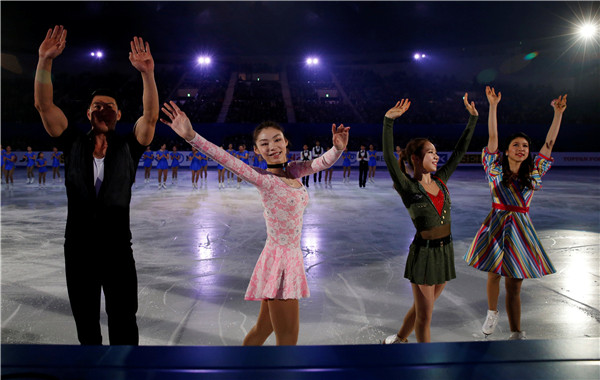Winter Asiad lays bare sport's uneven development
( Xinhua ) Updated: 2017-03-04 07:21:01
 |
|
Figure skating pairs gold medalists Zhang Hao and Yu Xiaoyu of China, ladies gold medalist Choi Dabin of South Korea and Ice Dance's silver medalist Kana Muramoto of Japan (left to right) greet spectators in an exhibition during the closing ceremony of the 2017 Asian Winter Games. KIM KYUNG-HOON |
SAPPORO, Japan - The Asian Winter Games in Sapporo didn't produce a new medal-winning country until the penultimate day of the weeklong event. Two decades after it was launched in Sapporo, the Asian version of the Winter Olympics remains dominated by an elite club of a few countries.
The Democratic People's Republic of Korea won its first medal in Sapporo on Saturday to become the only fifth country on the medal table as DPR Korea's Ryom Tae Ok and Kim Ju Sik finished third in the figure skating pairs event.
Ahead of DPR Korea are Japan, South Korea, China and Kazakhstan - the typical "Big Four," as always.
The small number of countries that were successful should be a cause for concern to the Olympic Council of Asia (OCA), considering that some 30 Asian delegations competed for medals.
As the largest-ever Games in number of participating delegations, the Sapporo Asiad also welcomed Australia and New Zealand to compete as guests, although these countries did not vie for medals.
Only 10 countries have touched medal in eight editions of the Games. As for gold, the number is down to eight, which includes three one-timers.
DPR Korea's first and only gold came from the first Games in 1986 while Lebanon had one in 2003.
Uzbekistan claimed its sole Asiad gold in 1999, despite having reached the medal table four times.
With Asia set to host two straight Winter Olympics - Pyeongchang in 2018 and Beijing in 2022, plus the 2020 Summer Games in Tokyo, the OCA is hoping the continent is living up to its billing as a hub of the Olympic Games.
OCA President Sheikh Ahmad Al Fahad Al Sabah said he believed the Sapporo Games would open "a period of unprecedented growth" in winter sports throughout the continent.
The official expects China to play a bigger role in the popularization of winter sports.
"China is expected to introduce 300 million people to winter sports during this period, so the next few years are pivotal in establishing a vast, new winter sports scene outside of the traditional markets of North America and Europe," he said.
|
|
|
|
|
|
|
|

























 Raymond Zhou:
Raymond Zhou: Pauline D Loh:
Pauline D Loh: Hot Pot
Hot Pot Eco China
Eco China China Dream
China Dream China Face
China Face






